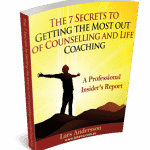Anti-depressants for depression? A critical question.
 According to the World Health Organisation depression is one of the leading causes of disability worldwide, and yet only 25% of sufferers have access to effective treatments [Ref. 1]. The first-line medical treatment for people meeting current diagnostic criteria for major depressive disorder is a prescription of anti-depressants, since such medication for long has been considered an effective treatment. This article looks at some of the less known facts that have come out of research in this regard, and suggests that caution may be required, and that non-pharmaceutical treatment may be a better alternative than anti-depressants in many, if not most, cases.
According to the World Health Organisation depression is one of the leading causes of disability worldwide, and yet only 25% of sufferers have access to effective treatments [Ref. 1]. The first-line medical treatment for people meeting current diagnostic criteria for major depressive disorder is a prescription of anti-depressants, since such medication for long has been considered an effective treatment. This article looks at some of the less known facts that have come out of research in this regard, and suggests that caution may be required, and that non-pharmaceutical treatment may be a better alternative than anti-depressants in many, if not most, cases.
Common anti-depressants
Anti-depressants aim at stabilising and normalising the brain’s neurotransmitters; serotonin, dopamine, and norepeniphrine. We know that these neurotransmitters play a vital role in regulating mood, but we do not know the exact mechanism for how they do it. The most common anti-depressants are the so called SSRIs, SNRIs, TCAs and MAOIs.
SSRIs (selective serotonin reuptake inhibitors) are the newest anti-depressants, and are currently the most commonly prescribed. Examples of SSRIs are; Prozac (fluoxetine), Celexa (citalopram), and Zoloft (sertraline).
SNRIs (serotonin-norepinephrine reuptake inhibitors), which are similar to SSRIs, are also very commonly prescribed anti-depressants. Effexor (venlafaxine) and Cymbalta (duloxetine) are examples of SNRIs.
TCAs (tricyclic antidepressants) are an older type of anti-depressants, which these days are primarily prescribed to people who experience high levels of unpleasant side effects with SSRIs or SNRIs.
MAOIs (monoamine oxidase inhibitors) are also an older type of anti-depressants, which these days are rarely prescribed, due to serious – potentially lethal – side effects.
Side effects from anti-depressants
As all medications, anti-depressants have side effects; some mild and some severe, some common and some not so common. The list of possible side effects for each type of anti-depressants is long, too long to cover in its entirety here. Listed below are a few examples and comments.
SSRIs and SNRIs commonly cause headaches, nausea, insomnia, feeling jittery, erection problems, delayed ejaculation, lowered sex drive, and difficulty reaching orgasm.
More worrying however are the results from a large study running over six years and involving more than 130,000 women in ages between 50 and 79. This study found that the women who were taking anti-depressants (primarily SSRIs) were 45% more likely to suffer a stroke. It also found that the anti-depressant users had a 32% higher risk of death from any cause, compared to non-users [2].
A research team from the US actually consider serotonin regulating anti-depressants to do more harm than good, not only due to serious issues as those mentioned above, but due to the disruption that these anti-depressants cause to a whole range of adaptive natural processes that are regulated by serotonin. Their research also revealed strong indications that people who overcome their depression without the use of anti-depressants are less likely to experience relapse episodes later on [3].
TCAs commonly cause dry mouth, dry nose, blurry vision, constipation, urinary retention, cognitive and/or memory impairment, and increased body temperature. They may also cause drowsiness, anxiety, confusion, restlessness, dizziness, sexual dysfunction, muscle twitches, weakness, nausea and vomiting.
MAOIs have potentially very severe side effects, due to their reactiveness with certain foods (e.g. Vegemite, alcoholic drinks, aged cheeses) and with other drugs (including other medications, illicit drugs, and natural supplements like St John’s Wart). In the worst case scenario the outcome may be psychosis, and elevated-blood pressure crisis leading to stroke and death.
But anti-depressants work, don’t they?
Well actually, in the last few years several research studies have been published that have found quite the opposite, or to be fair, that anti-depressants are no more effective than placebo (pills that contain no active ingredients – sometimes incorrectly referred to as “sugar pills”).
One such study was a meta-review (combining results from several studies), which obtained data on all clinical trials submitted to the US Food and Drug Administration (FDA) for the licensing of the four new-generation anti-depressants for which full datasets were available in 2007. The study found that placebo treatments were as effective as anti-depressants, except for very severely depressed patients. Interestingly though, the researchers found that the better performance of anti-depressants for severely depressed patients was due to these patients’ inability to respond to placebo treatments, not the actual effects of the anti-depressants themselves [4].
Another meta-review published in The Journal of the American Medical Association in 2010 yielded similar findings. This research reviewed the results from 6 studies (involving 718 people in total), which compared the effect of anti-depressants with the effect of placebo, and found them both to be equally effective for mild and moderate depression. In regards to severely depressed patients, the study found that anti-depressants were more effective, but made the reservation that they had been unable to determine whether this was due to the drugs working better or the placebo not working so well for these patients [5].
Even a study partially funded by the pharmaceutical industry, which was published this year (2012) and involved 156 patients diagnosed with major depression, concluded with the admission that the research had “failed to confirm” that treatment with anti-depressants was any better than placebo treatment [6].
So what are the options?
At this point it is important that I make one thing absolutely clear; I am not saying with this article that people should not take anti-depressant medication. This is a medical determination, and I am not a medical practitioner, and therefore cannot advice anyone in medical matters. What I am saying is that you may want to consider whether anti-depressants are the right choice for you, and to make sure that your choice to do, or not, is an informed choice.
There are other treatments that have shown to be at least equally effective for depression, either on their own or in combination with anti-depressants. Various forms of psychotherapy and psychological treatments for depression have been demonstrated effective by a large number of research studies, and may in many cases be a better alternative for most people who experience depressive symptoms. To read more about this, please go to the article “Treating depression – a case for psychotherapy.”
References
- World Health Organization. (2008). Depression. Retrieved 13th of October, 2008, from http://www.who.int/mental_health/management/depression/definition/en.
- Smoller, J. W. et al. (2009). Antidepressant use and risk of incident cardiovascular morbidity and mortality among postmenopausal women in the women’s health initiative study. Archives of Internal Medicine December 14/28 2009; 169(22), pp. 2128-2139.
- Andrews, P. W., Anderson Thomson Jr, J., Amstadter, A., & Neale, M. C. (2012). Primum non nocere: an evolutionary analysis of whether antidepressants do more harm than good. Frontiers in Psychology. April 2012, Vol. 3, Article 117.
- Kirsch, I., Deacon, B. J., Huedo-Medina, T. B., Scoboria, A., Moore, T. J., et al. (2008). Initial severity and antidepressant benefits: A meta- analysis of data submitted to the Food and Drug Administration. PLoS Med 5(2): e45. doi:10.1371/journal. pmed.0050045.
- Fournier, J. C., DeRubeis, R. J., Hollon, S. D., et al. (2010). Antidepressant Drug Effects and Depression Severity: A Patient-Level Meta-analysis. JAMA. 2010, 303(1) p. 47-53.
- Barber, J. P., Barrett, M. S., Gallop, R. G., PhD; Rynn, M. A., & Rickels, K. (2012). Short-Term Dynamic Psychotherapy Versus Pharmacotherapy for Major Depressive Disorder: A Randomized, Placebo-Controlled Trial. J Clin Psychiatry 2012, 73(1), p. 66–73.

